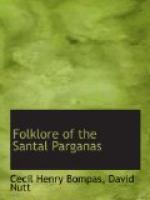Another trick that Lelsing played his brothers was this: he used to mix rupees in the food he gave his donkey, and these passed out in the droppings; and Lelsing took care that his brothers should know of it. They found no rupees in the dung of their horses, and consulted Lelsing as to the reason why. He told them that if they gave their horses a blow with an axe while they ate their grain, they would find rupees in the dung. The brothers did as they were advised, but the only result was that they killed all their horses.
More and more angry, the brothers resolved to kill Lelsing by guile. So they went to him and said that they had found a wife for him, and would take him to be married. When the procession was ready, Lelsing got into a palki. His brothers made the doors of the palki fast and carried him off towards a deep river, into which they meant to throw him, palki and all.
When they reached the river, they put the palki down and went to look for a suitably deep pool. Lelsing found that he was outwitted, and began to weep and wail. Just then a shepherd came by, driving a flock of sheep and asked what was the matter. Lelsing cried out that they were going to marry him against his will, but that anyone who would take his place in the palki could marry his bride. The shepherd thought that this would be a great opportunity to get a wife without spending any money on the marriage, and readily changed places with Lelsing, who drove away the flock of sheep. The brothers soon came back and, picking up the paiki, threw it into the river and went home, thinking that they had at last got rid of Lelsing.
But four or five days later Lelsing appeared, driving a large flock of sheep. His brothers asked him, in amazement where he had come from, “You threw me” said Lelsing “into a shallow pool of the river where there were only sheep, but in the deeper parts there are cattle and buffaloes as well. I can take you to fetch some of them if you like. You take your palkis to the bank of the river,—for I cannot carry you all—and then shut yourselves inside and I will push you into the water.” So the brothers took their palkis to the river side and shut themselves in, and each called out “Let me have the deepest place, brother.” Then Lelsing pushed them in one by one and they were all drowned. Then he went home rejoicing at the revenge which he had taken for their ill treatment of him.
LXVIII. The Stolen Treasure.
Once upon a time three jars full of money were stolen from a Raja’s palace. As all search was fruitless the Raja at last gave notice that, whoever could find them, should receive one half of the money. The offer brought all the jans and ojhas in the country to try their hand, but not one of them could find the treasure.
The fact was that the money had been stolen by two of the Raja’s own servants and it fell to the duty of these same two men to entertain the ojhas who came to try and find the money. Thus they were able to keep watch and see whether any of them got on the right track.




